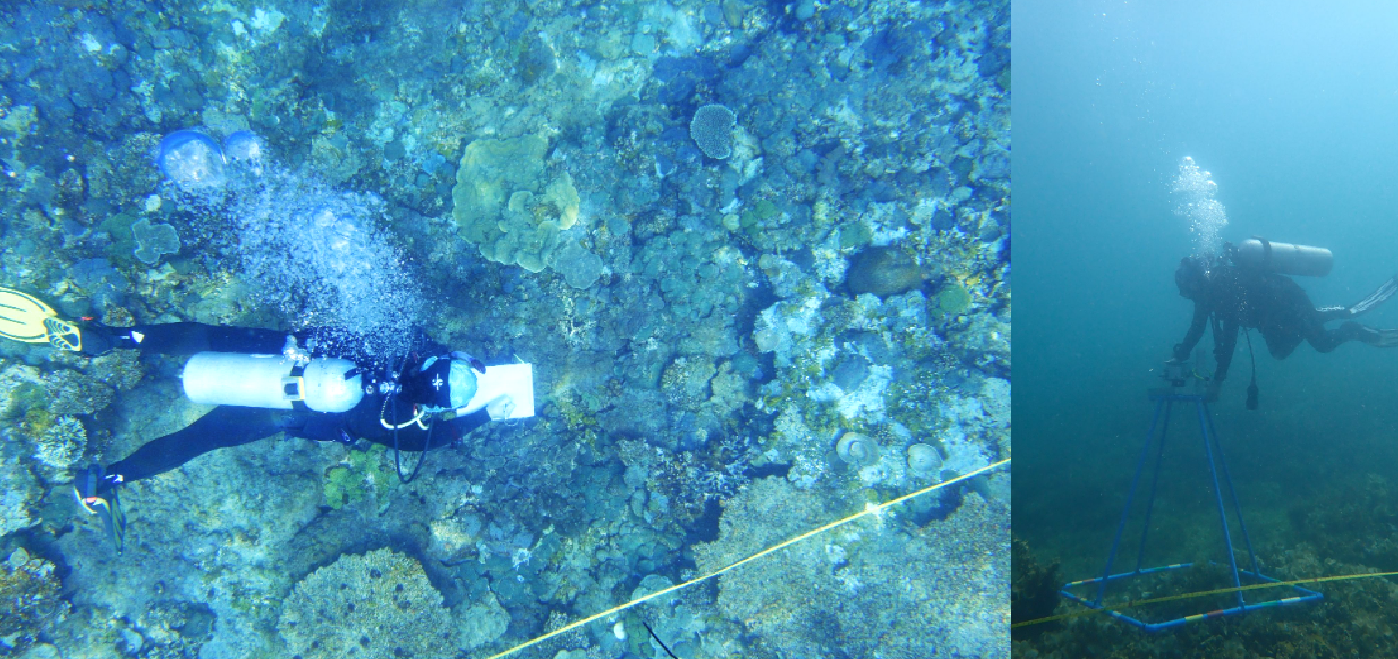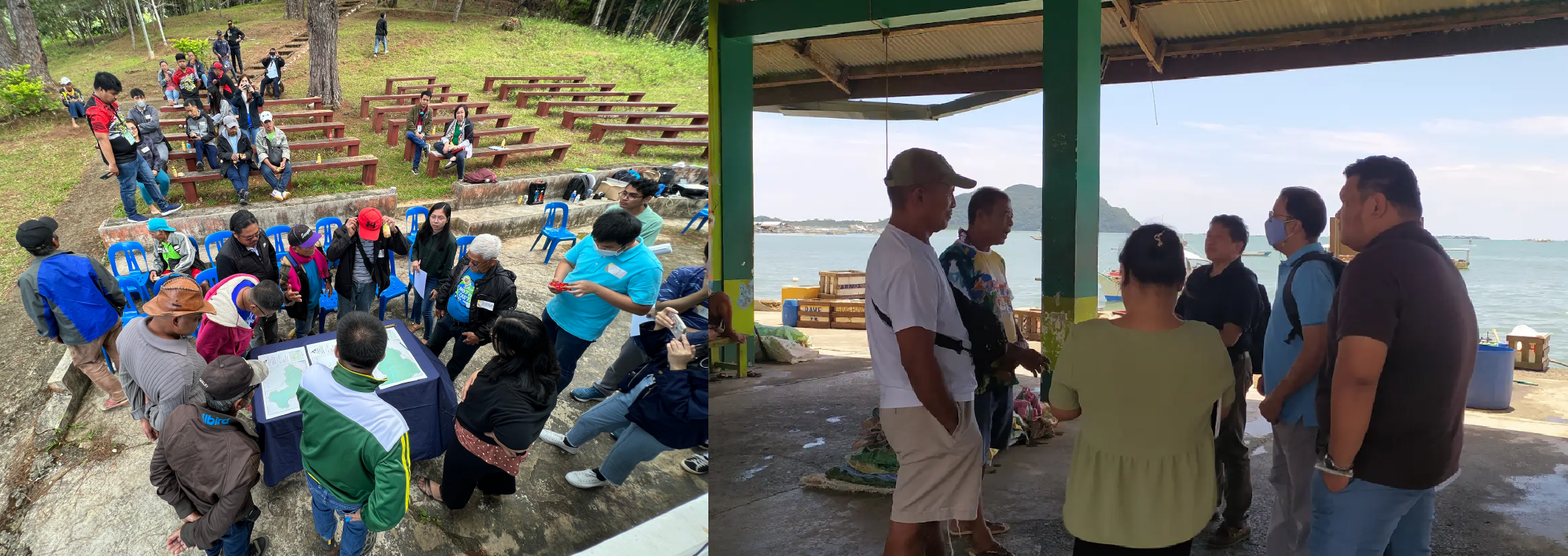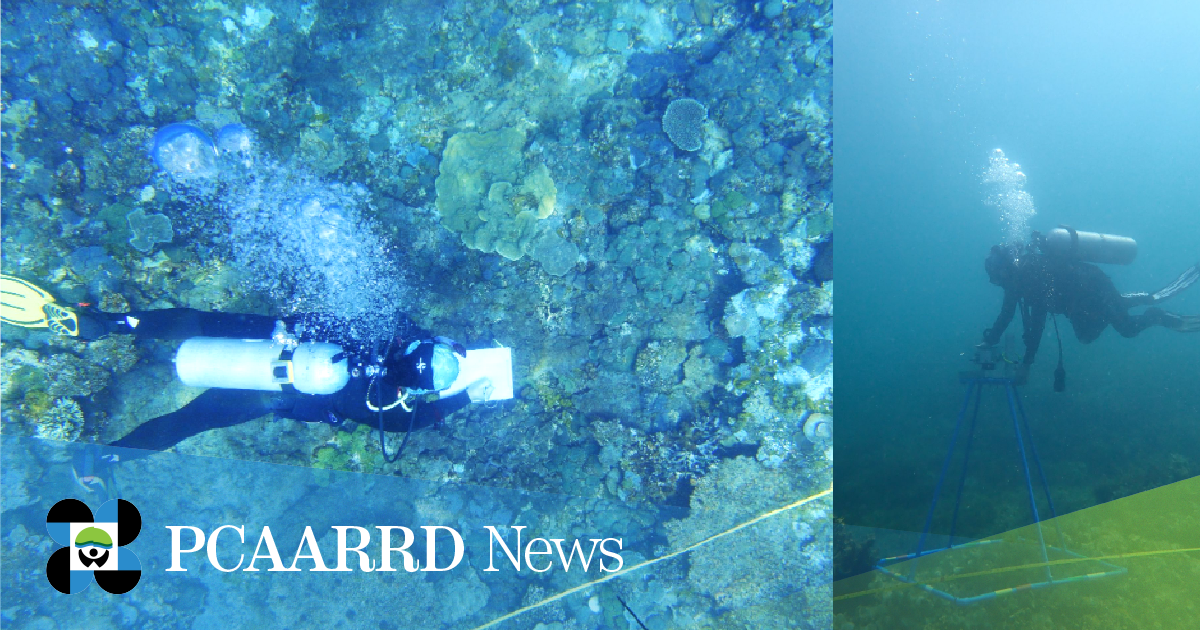
Fish survey (left) and coral survey (right) conducted as part of the REINVEST project. (Image credit: RE-INVEST Project Team)
Recognizing the importance of ecosystems and ecosystem services valuation, the Philippine Council for Agriculture, Aquatic and Natural Resources Research and Development of the Department of Science and Technology (DOST-PCAARRD) has long integrated resource and ecosystem assessment, monitoring, and valuation into its Natural Resources and Environment Research and Development (R&D) Agenda and Socio-Economics R&D Agenda.
Since 2017, the Council has funded programs and projects focused on the economic valuation of ecosystem services, developing policy options for access and benefit sharing (ABS), and sustainable financing mechanisms like payment for ecosystem services.
President Ferdinand R. Marcos Jr. signed into law the Republic Act (RA) No. 11995 or the “Philippine Ecosystem and Natural Capital Accounting System (PENCAS)” Act, on May 22, 2024. This legislation establishes a comprehensive framework for assessing and managing various ecosystems and their services, marking a significant step in integrating environmental considerations into national policy frameworks.
This supports DOST-PCAARRD's ongoing initiatives and fortifies the integration of ecosystem valuation into broader policy and decision-making processes. The PENCAS Act promotes sustainable environmental practices and informed policymaking, aligning with global sustainability goals.
The PENCAS Act mandates the inclusion of the country’s natural resources as a vital component of the national economy, supplementing traditional metrics such as gross domestic product (GDP) and human capital. This approach will ensure that natural resources are managed and protected based on accurate data regarding their true contribution to the economy, paving the way for sustainable development in the Philippines.
With a total of P131.84 million allocated to eight environment-related projects, the Council is dedicated to contributing to the establishment of ecosystem accounts. These efforts aim to support sustainable management and development plans for crucial areas such as Mt. Malindang Range Natural Park, Pantabangan-Carranglan Watershed Forest Reserve, and other critical ecosystems of the country.

Field activities at the Pantabangan-Carranglan Watershed Forest Reserve (left) and RE-INVEST Project 2 (right). (Image credit: UPLB Project Team)
DOST-PCAARRD is currently supporting a two-year project (2023–2025), led by Dr. Agustin L. Arcenas of the University of the Philippines Los Baños, which aims to develop a downscaled Natural Capital Accounting (NCA) framework based on the United Nations Framework. This framework can be used by the National Economic and Development Authority (NEDA), the Department of Environment and Natural Resources (DENR), and the Philippine Statistics Authority (PSA) for their National NCA Roadmap. Having a localized database for site-specific application of the NCA is in line with the Executive Order No. 138 s. 2021, or the Mandanas Ruling, aimed at developing capabilities of LGUs in increasing productivity and employment, promoting local economic growth, and managing public resources.
The Council also funded the establishment of the Valuation and Accounting of Ecosystem Services (VALUES) Lab: Building Capacity for Sustainable Forest and Natural Resources Management. Established by the University of the Philippines Los Baños (UPLB), this laboratory aims to enhance the capacity of researchers and local planners in natural capital and ecosystem services valuation. It will also serve as a repository of data and information from valuation studies and develop localized guidelines based on internationally accepted frameworks, such as the UN System of Environmental-Economic Accounting (UN-SEEA) Central Framework and the UN-SEEA Ecosystems Accounting Framework.
DOST-PCAARRD spearheaded the Ecosystem Accounting Training last year to enhance the capabilities of researchers and stakeholders. This training was participated in by government agencies and State Universities and Colleges (SUCs) representatives. Resource persons during the training were policy champions in ecosystem accounting from the University of the Philippines Los Baños (UPLB); the Economy and Environment Group (EEG); and the Resource, Environment and Economics Center for Studies (REECS).
The data collected through DOST-PCAARRD’s R&D projects will play a critical role in fulfilling the agency’s mandate to contribute to the collection, generation, analysis, and presentation of statistics and data requirements for PENCAS.
DOST-PCAARRD is committed to advancing its efforts by supporting additional projects and programs to establish comprehensive natural capital accounts, which will be crucial in formulating science-informed policies and programs. This commitment will enhance DOST-PCAARRD’s ability to provide evidence-based recommendations, guide effective policy decisions, and ensure that environmental and ecosystem considerations are at the forefront of national development strategies.

